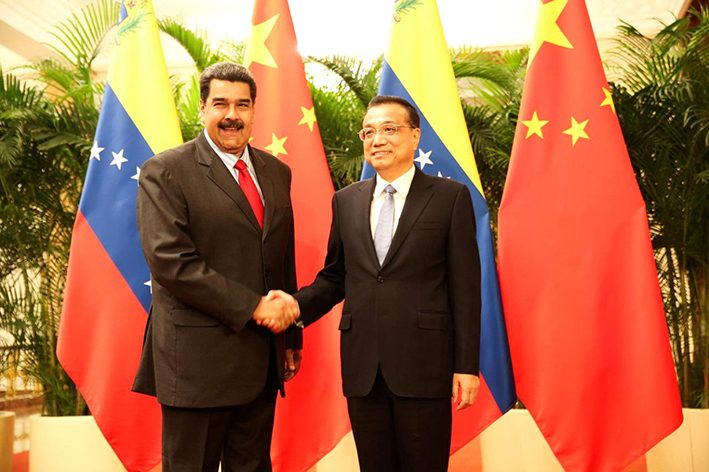BEIJING/CARACAS, (Reuters) – Venezuela gave China another stake in the OPEC member’s oil industry and signed several other deals in the energy sector, but Beijing made no mention of new funds for Caracas during President Nicolas Maduro’s visit to his government’s key financier yesterday.
Maduro’s leftist government sold a 9.9 percent stake in the low-cost Sino-vensa joint venture, where China National Petroleum Corporation has a 40 percent share, to China, it said in a statement.
The statement also said China and Venezuela had signed a “memorandum for cooperation in Ayacucho bloc 6,” located in Venezuela’s vast oil-rich Orinoco Belt, without elaborating.
China will drill 300 wells in Ayacucho and extend $184 million in financing for the joint oil venture Petrozumano, the statement added. A source at Venezuelan state oil company PDVSA , who asked to remain anonymous because he is not allowed to speak to media, said oil services and procurement at Sinovensa would be handled by Chinese companies.
It was unclear what China, which has ploughed more than $50 billion into Venezuela through oil-for-loan agreements, was giving in return.
PDVSA and Vene-zuela’s Information Minis-try did not respond to a request for information about the deal. Maduro said on Thursday he was going to China on a four-day trip with “great expectations” and promised to return with “big achievements.”
Premier Li Keqiang told Maduro that Beijing was willing to provide the crisis-hit country with what help it can, according to Chinese government statements yesterday.
But there was no reference in Chinese state media or in Chinese government statements to new funds for Venezuela, which is struggling with a fifth year of recession and an economy wracked by hyperinflation.
Over a decade, oil-for-loan agreements helped China secure energy supplies for its fast-growing economy while bolstering an anti-U.S. ally in Latin America.
The flow of cash halted nearly three years ago, however, when Venezuela asked for a change of payment terms amid falling oil prices and declining crude output that pushed its state-led economy into a hyperinflationary collapse.
Venezuela’s finance ministry in July said it would receive $250 million from the China Deve-lopment Bank to boost oil production but offered no details. Venezuela previously accepted a $5 billion loan from China for its struggling oil sector but has yet to receive the entire amount.
Venezuela’s opposition politicians say Maduro’s desperate government is ceding oil assets on the cheap to stay afloat despite U.S. sanctions and falling oil production.
“This acknowledges that oil policy to date has been a failure in which PDVSA shows it is a highly inefficient and corrupt company that is incapable of increasing production and so needs more financing, as in this case,” said economist and opposition legislator Angel Alvarado.
In a separate meeting with Chinese President Xi Jinping, Maduro said Venezuela was willing to “explore effective financing methods” with China and strengthen cooperation in the energy sector, Chinese state media said, citing Maduro without elaborating.
Xi told Maduro China would, as before, support the Venezuelan government’s efforts to seek stability and development.










